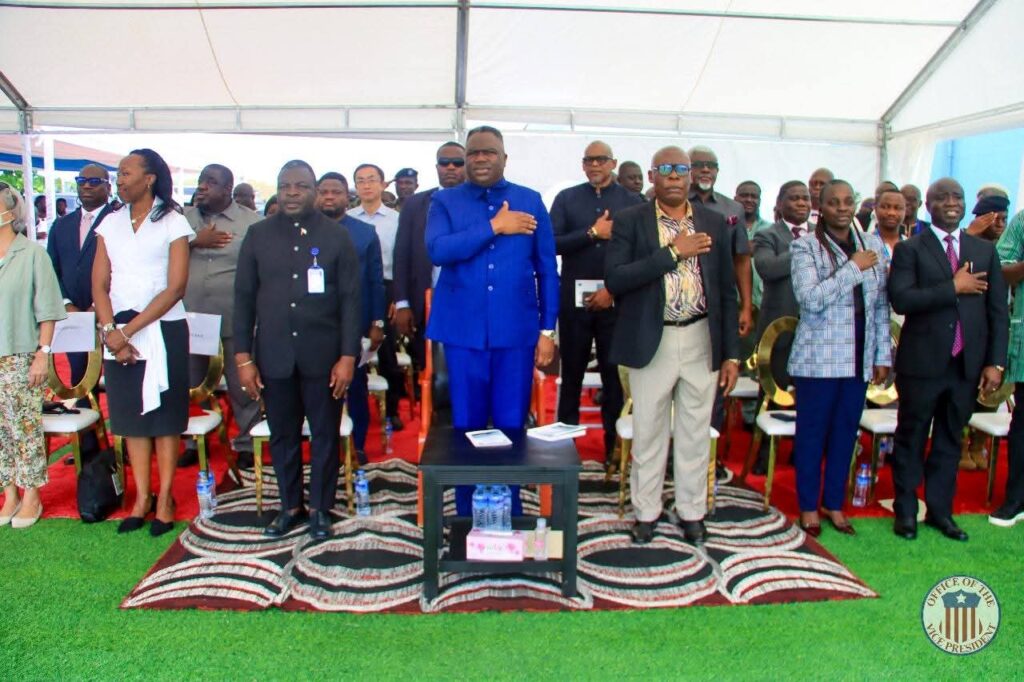By Akoi M. Baysah, Jr.
Liberia’s fisheries sector reached a historic milestone on Monday as the National Fisheries and Aquaculture Authority (NaFAA) commissioned the Sea King, the nation’s first semi-industrial fiberglass fishing vessel, alongside 23 locally manufactured modern artisanal canoes.
The launch, celebrated at the Mesurado Pier, was described by NaFAA Director-General as “a national awakening” and a bold step toward modernizing Liberia’s blue economy.
The NaFAA DG said the commissioning of the Sea King signals a new era of innovation, transparency, and strategic reform under the Government’s ARREST Agenda.
Saygbe emphasized that the advancement under his leadership at NaFAA is a result of the intentional leadership from President Joseph Nyuma Boakai, Sr. and Vice President Jeremiah Kpan Koung, paired with deep structural reforms within NaFAA.
Underscoring the wide-ranging changes under his leadership, the Director General highlighted the major transformative accomplishments he has driven.
Saygbe mentioned that the seven achievements includes: the approval of Liberia’s Fisheries Management Plan, a fully modernized Monitoring, Control & Surveillance system with real-time offshore tracking, the training of more than 500 fish farmers across Liberia, the activation of the Fisheries Information Management System, reducing permit processing from weeks to 48 hours.
He further highlighted plans for the construction of a state-of-the-art Fisheries Complex, with a new four-story headquarters set to be commissioned next year, along with the establishment of a Department of Environment & Climate Change and ongoing decentralization efforts, including the opening of a regional office in Harper by June 2026.
The NaFAA Acting Director General noted that these milestones were achieved in only seven months since he assumed office.He disclosed that more investments are underway, including a modern Industrial Fishing Port expected to generate 2,000–2,500 jobs.
The Acting DG expressed that the launch Sea King was Constructed using advanced Glass Reinforced Plastic technology, and is equipped with a 20 m³ fish hold, 10 m³ ice storage, and a 25 m³ fuel capacity.

According to him, the vessel will boost production, strengthen food security, expand small businesses, and create new opportunities for youth, adding that a transparent Public Private Partnership (PPP) process is being finalized to ensure the vessel operates in the national interest.
Saygbe said the 23 artisanal fiberglass canoes produced locally will be distributed through a business incubation program targeting women fishmongers and will host a major Fisheries Investment Conference from March 30–31, 2026 to attract private-sector financing, as a means of showcasing the sector’s reforms and investment-ready opportunities.
The DG reported that 1,422 women have received business grants under a World Bank–supported program through Conservation International, emphasizing further that NaFAA has Internally introduced health insurance for employees and life insurance for fisheries observers, and recently acquired a 32-seater staff bus.
He reaffirmed NaFAA’s commitment to lifting the EU Yellow Card imposed on Liberia in 2017, calling it vital for restoring export credibility and unlocking investment while stating that the Sea King represents more than modernization, it reflects a new national mindset that embraces innovation, discipline, and unity of purpose.“Liberia is rising,” he said.
“With strong leadership, clear vision, and committed institutions, great things are inevitable.”World bank, other speakers lavish praises at the NaFAA acting Director General, Cyrus Saygbe for his innovation and farsightedness in leading the Fishery sector.
Georgia Wallen, World Bank Country Manager further praised the Government’s commitment to modernizing the fisheries sector, highlighting the launch of the Sea King and the locally produced fiberglass canoes as tangible examples of sustainable development.
Madam Wallen highlighted increased investment in fisheries education, particularly the University of Liberia’s fisheries program, along with expanded training opportunities and support for women entrepreneurs as key contributors to the sector’s continued growth.
She also pointed to the advancements in monitoring and security systems that are strengthening accountability within the industry.She emphasized that the World Bank’s support, ranging from funding infrastructure projects to empowering women entrepreneurs, reinforces Liberia’s drive to strengthen food security, create jobs, and attract private-sector investment.


